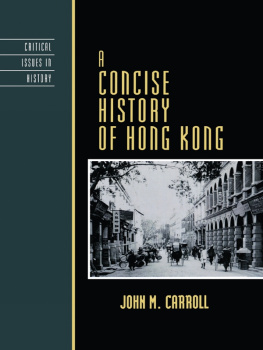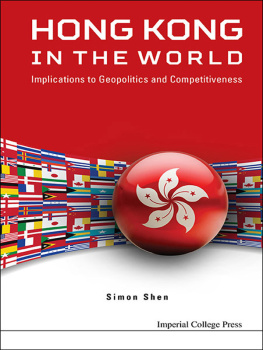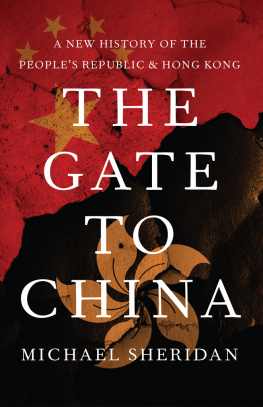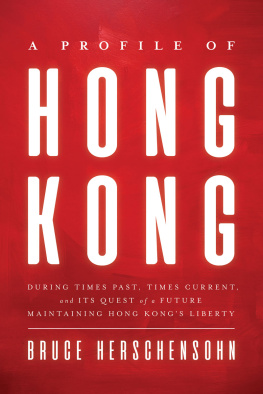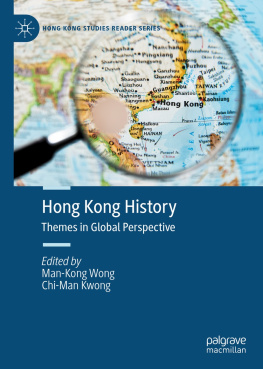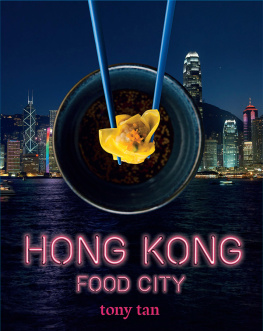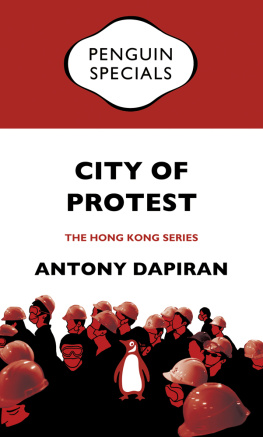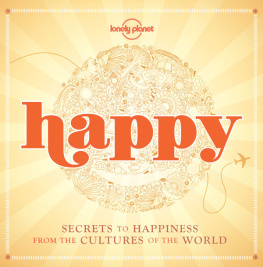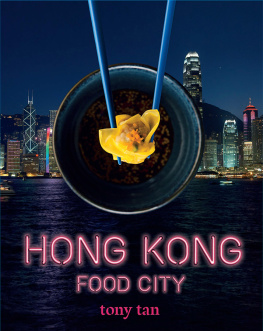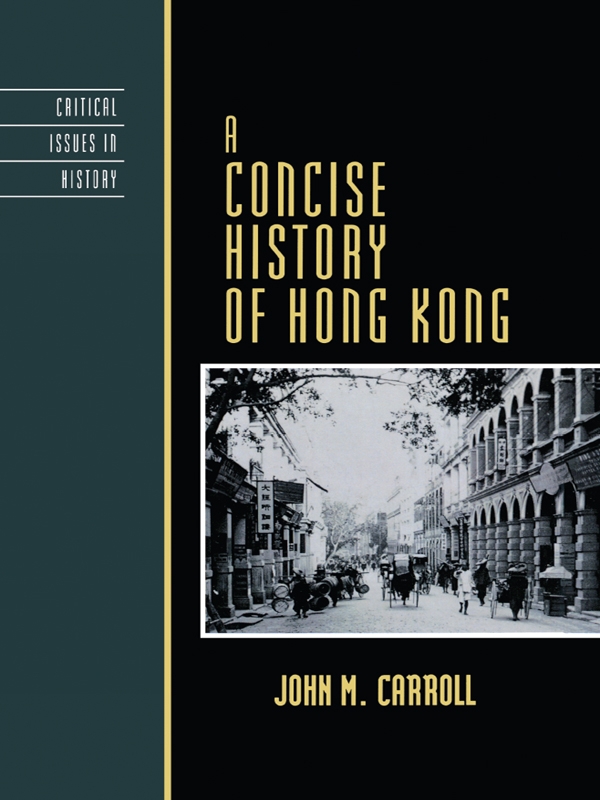Completing this book took approximately as long as the Sino-British negotiations of 19821984, which established the terms for Hong Kongs reversion to Chinese sovereignty in 1997. I am particularly grateful to the other scholars whose work I have referred to throughout the book. Consulting editor Donald Critchlow encouraged me to contribute to the Critical Issues in History series, and I would like to thank the editorial staff at Rowman and Littlefield, especially Susan McEachern and Sarah Wood, for their assistance and patience. A Faculty Research Initiative Grant from Saint Louis University enabled me to complete the early chapters of the book. Alan Smart of the University of Calgary, Michael Houf of Texas A&M University at Kingsville, Colin Day of Hong Kong University Press, and Christopher Munn all offered invaluable comments on earlier drafts, and Charles Parker of Saint Louis University and Steven Miles of Washington University provided encouragement and moral support. Tim Ko kindly supplied three photographs from his personal collection. Space prevents me from listing all the many friends and family members who have helped along the way, but I would be remiss if I did not express my sincere thanks to my wife and daughter, Katie Monteil and Emma Carroll-Monteil.
Epilogue
Beyond 1997
The burning question surrounding Hong Kongs reversion to Chinese sovereignty has been how this former British colony will survive under the one country, two systems arrangement. Time of Certainty Begins: Will Beijing Honor Vows? asked the front page of the New York Times on July 1, 1997. Two years later, political scientist James Hsiung noted that most predictions about Hong Kongs future after the handover had been dismal and downright pessimistic. The worst scenario saw Beijing meddling in Hong Kongs politics and economic life, and trampling upon its freedoms, including freedom of the press, judicial freedom, academic freedom, and free elections. There would be corruption, nepotism, cronyism, and related plagues, brought in by the Mainland Chinese.
As journalist Frank Ching argued in 1999, these doom-and-gloom predictions overlook how Peoples Republic of China (PRC) policy toward Hong Kong has always been dictated by self-interest. China could have recovered Hong Kong much earlier if it had wanted toin 1949 when Peoples Liberation Army troops stopped at the Hong Kong border, or during the Cultural Revolution when the central government stopped the Red Guards from crossing into Hong Kongbut the PRC government had good reasons for not wanting to bother Hong Kong. The colony served as a window to the outside world and a base for trade with non-Communist countries, provided a supply of smuggled goods during the American and United Nations embargoes in the 1950s, and aided the PRCs economic development in the 1970s. Still, Ching acknowledged concerns that the PRC government might interfere in Hong Kong to protect its monopoly on power: Chinas promise not to interfere in Hong Kongs internal affairs is similar to a left-handed person promising only to use his right hand. The promise may very well be sincere but, in the absence of restraints, the left-handed person will sooner or later forget and, without even realizing it, start using his left hand.
The most pressing challenges to the new Hong Kong Special Administrative Region (HKSAR) had little to do with the reversion to Chinese sovereignty. From early 1997 to early 1998, for example, the chicken flu (the H5N1 bird flu virus) killed six people and prompted the HKSAR government to order the slaughter of almost 1.5 million chickens. The Asian financial crisis, caused by currency devaluation in Thailand only one day after the end of British rule in Hong Kong, precipitated a decline in the Hong Kong stock market and property values, unemployment, and a recession from which the HKSAR did not fully recover until 2004. In March 2003, Hong Kong was hit by Severe Acute Respiratory Syndrome (SARS), an extremely contagious and potentially deadly form of pneumonia. When the disease was finally controlled in June, some eighteen hundred people had been diagnosed with SARS, almost three hundred of whom died. Hong Kongs tourist industry suffered, which further harmed the regions economy. The HKSAR government has also faced the problem of keeping Hong Kong economically competitive in a rapidly globalizing world and in the face of increased competition from mainland China, especially since Chinas entry into the World Trade Organization in 2001 has diminished Hong Kongs traditional position as a doorway to China.
Hong Kong has not only survived the reversion to Chinese sovereignty, but observers also frequently express surprise at how little the region seems to have changed since 1997. Many senior government officials have remained in place. English continues to be the language of success in business and government. Hong Kongs expatriate community still comprises 2-3 percent of Hong Kongs population. Most Western expatriates never learn Chinese, still live in better housing and have higher salaries than most local Chinese, and do not plan to stay in Hong Kong for long. British expatriates, some with family ties to Hong Kong dating back to the late 1800s, continue to make more money than they ever could in Britain. Although in 1996 the British government granted the seven thousand South Asians (mostly Indians) in Hong Kong the right of entry and abode in Britain, there is still a sizable Indian community. The Gurkhas, the Nepalese warriors who once fought so proudly for the British Army, no longer serve their colonial masters, but they are now seen throughout Hong Kong as security guards at apartment complexes, office buildings, and shopping malls. (The majority of expatriates, however, have no historical connections to British colonialism: they are the Filipino and Thai women who work as domestic servants for middle- and upper-class Chinese and expatriate families.) Horse racing, protected under the one country, two systems arrangement, enjoys a fanatical popularity almost inexplicable to visitors. The main leisure activities in Hong Kong are still eating and shopping, with restaurants and shopping malls galore. Despite the change of guards, and of the emblems, James Hsiung concluded in 1999, little seemed to have changed for the people in the street.
Even while drawing attention to Hong Kongs uncertain future, the reversion to Chinese sovereignty put the region in the international spotlight in a way that further enhanced its global reputation as a vibrant, cosmopolitan society. In July 2004, a record number of almost two million tourists came to Hong Kong, more than half of them from the mainland. Western tourists also come to Hong Kong in large numbers, although their purpose for coming has changed. Whereas Europeans and Americans used to travel to Hong Kong to catch a glimpse of Communist China across the border, they also came to see traditional China, preserved in the New Territories and seemingly unchanged by the Communist revolution across the border. Now, Western newspapers and magazines brim with articles about Hong Kong, its efforts to promote its heritage, and the dynamic, hybrid flair reflected in its cinema, cuisine, and architecture. The common view of Hong Kongheld mainly by local expatriatesas a cultural desert is not true. Orchestras visit from all over the world (especially during the annual Hong Kong Arts Festival), and Hong Kong has its own orchestra, philharmonic, and dance companies as well as a plethora of new museums. Organizations such as the Hong Kong Branch of the Royal Asiatic Society, founded in 1847 by Governor John Davis, continue to promote interest in Hong Kongs history and culture.

